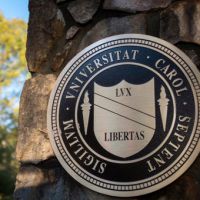
InsideTraCS — with Kaitlin Zalcikova
InsideTraCS: Get to know your extended research team through a series featuring conversations with faculty and staff.
Kaitlin Zalcikova, PhD
Kaitlin Zalcikova, PhD, is the Program Manager for the Clinical and Translational Science (CTS) Research Program and Team Science Program at NC TraCS, which she joined in 2021. Applying her evidence-based mindset to the discipline of team science, Zalcikova works with teams to help them translate their scientific discoveries into tangible clinical outcomes.
Marla Broadfoot, NC TraCS science writer, recently spoke with Zalcikova about her background in clinical research and scientific consulting; helping multidisciplinary teams with funding and project management support; and her focus on helping bridge the gap between scientific discoveries in the lab and improvements in patient care.
How did you get involved in team science?
Prior to joining NC TraCS, I spent more than 10 years (I have a BS in biochemistry and a PhD in neuroscience) doing both basic and clinical research. I was also a scientific consultant, helping small businesses obtain funding to translate their health technologies into real-world applications. I've witnessed many collaborative efforts—and I've seen some teams flourish and others falter.
Through my first role at TraCS as a Team Science Project Manager, I was introduced to the "science of team science," which explores why some teams succeed where others struggle. I've since learned ways to more effectively and efficiently form, manage, and sustain teams. There are many teams we are a part of in life—professional teams, research teams, sports teams—and learning how these teams can function better is not only a job skill, but also a life skill.
What is your specific role at NC TraCS?
I manage both the Team Science Program and our new Clinical and Translational Science (CTS) Research Program. Our Team Science Program offers assistance in finding collaborators, provides competitive funding and project management services to multidisciplinary teams through our Accelerating Collaborative Team Research (ACTeR) Program, and provides resources to improve team function.
Our new CTS Research Program (which is distinct from the CTS Pilot Program) provides support for high-impact projects that are trying to address truly significant roadblocks in clinical and translation science and to develop generalizable principles or insights that can be applied to accelerate translational research.
Why do you think team science is so important to clinical and translational science? Specifically, how can the team science approach help overcome barriers to the translation of research findings into practice?
"...clinical and translational science research demands that we investigate questions on a more holistic level and bring together teams with diverse expertise"
Zalcikova
A major barrier to translating research findings into clinical practice is the inherent complexity of biomedical problems, which often transcend the boundaries of individual disciplines.
If the ultimate achievement is to bridge the gap between scientific discoveries in the lab and improvements in patient care, clinical and translational science research demands that we investigate questions on a more holistic level and bring together teams with diverse expertise (such as basic scientists, biostatisticians, data scientists, epidemiologists, social scientists, clinicians, and regulatory experts).
An interdisciplinary team science approach to these questions promotes innovation, creativity, and more effective navigation of the translational landscape, which should enhance the applicability and implementation of the research.
More technically, understanding how teams can function in a way that is effective and efficient (again, the "science of team science") is paramount. Knowing how to advance that science beyond theory by applying the findings to teams is critical. Personally, I think the goal is really to marry the best team science practices and resources (such as tools, interventions, trainings, assessments), which will promote great "team work," with the best project management resources (like planning, tools, software), which will promote great "task work."
How is your work pivoting as a result of the new direction of the new CTSA grant?
Efforts in our Team Science Program are still heavily focused on our Advancing Collaborative Team Research (ACTeR) initiative, which has been highly successful (more below). We're also looking to build and share more team science resources on campus. With the grant renewal, we've been building out our new Clinical and Translational Science (CTS) Research Program as well. This program is currently supporting two ambitious CTS projects that we hope will have a significant translational impact. Soon we will be soliciting applications for new CTS Research Program projects through a CTS Innovation to Impact Awards Request for Applications (RFA). We hope to weave both team science and project management resources throughout the program.
You keep mentioning the ACTeR Program. What is that? Could you give an example of a project that has benefited from this program?
ACTeR stands for Advancing Collaborative Team Research.
It is a competitive, phased program that provides multidisciplinary teams with both funding and project management support to help them overcome barriers related to the formation and maintenance of their new team. Scientific teams often face challenges in coming together and this program seeks to provide the support to alleviate the 'task work' involved in such an endeavor. The first phase focuses on team-building activities, mini-symposiums, and brainstorming, while the second phase focuses on a pilot project and the preparation of a large, team grant application.
One of our most successful teams to date is the Translational Research to Expand Addiction Therapeutics (TREAT) Team (co-PIs: Joyce Besheer, PhD and Christian Hendershot, PhD), which consists of 23 members across 6 departments and schools (and 5 members from RTI). Through the ACTeR Program, the team created a shared vision: to mobilize a local team to pursue translational research in addiction science and establish a local pipeline for addiction therapeutics research. With ACTeR project management support, they've held more than 20 meetings and workshops, strategized for funding opportunities and projects to pursue, submitted 12 grants with collaborating team members (7 of which were funded), and are now working on their collaborative pilot project together.
I'm excited to see the ACTeR program expand and to support more teams on campus. I'm also excited to build out our team science and project management resources at TraCS.
Learn more about the Clinical and Translational Science (CTS) Research Program at tracs.unc.edu/services/cts-research-program.
NC TraCS is the integrated hub of the NIH Clinical and Translational Science Awards (CTSA) Program at the University of North Carolina at Chapel Hill that combines the research strengths, resources, and opportunities of the UNC-Chapel Hill campus with partner institutions North Carolina State University in Raleigh and North Carolina Agricultural and Technical State University in Greensboro.


